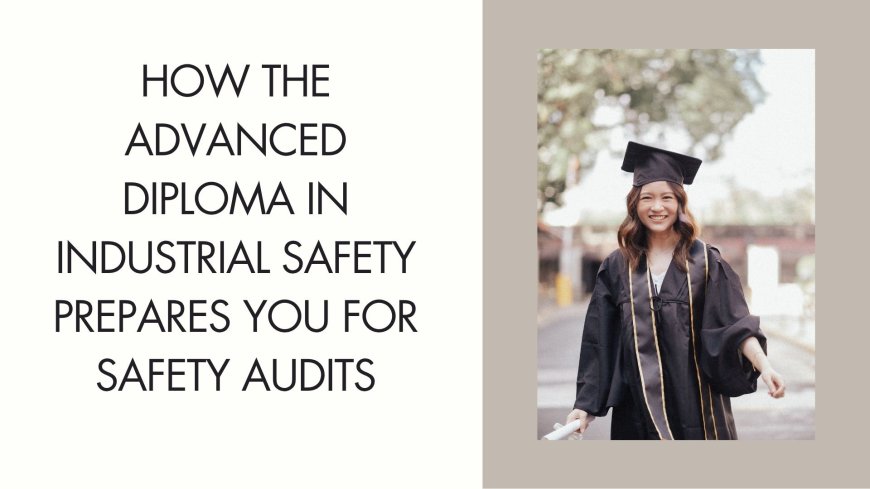How the Advanced Diploma in Industrial Safety Prepares You for Safety Audits
This is where the Advanced Diploma in Industrial Safety (ADIS) becomes immensely valuable. This specialized program is designed not only to enhance knowledge of

In todays industrial landscape, workplace safety has become a paramount concern across sectors, from manufacturing and construction to oil and gas and logistics. Ensuring a safe working environment isn't just a legal requirement, its a strategic priority for minimizing risks, protecting human lives, and maintaining operational efficiency. One of the key components of an effective safety management system is the safety audit, which assesses how well safety policies and practices are being implemented in an organization.
Professionals involved in occupational safety are often responsible for preparing, conducting, or participating in safety audits. This is where the Advanced Diploma in Industrial Safety (ADIS) becomes immensely valuable. This specialized program is designed not only to enhance knowledge of occupational health and safety standards but also to provide practical training and tools for conducting thorough and compliant safety audits.
Lets explore how the Advanced Diploma in Industrial Safety prepares you to take on safety audits confidently and competently.
Understanding Safety Audits: The Big Picture
A safety audit is a structured process of collecting independent information on the efficiency, effectiveness, and reliability of a companys total health and safety management system. It involves checking compliance with safety laws, company safety policies, and best practices.
Key goals of a safety audit include:
-
Identifying potential hazards.
-
Evaluating control measures.
-
Recommending corrective actions.
-
Ensuring compliance with safety regulations like ISO 45001, OSHA, and Factories Act.
Conducting a safety audit requires technical knowledge, observational skills, regulatory understanding, and proper documentation, skills that the ADIS program develops in detail.
Core Areas of the ADIS Curriculum Related to Safety Audits
The Advanced Diploma in Industrial Safety includes both theoretical and practical training. Here are specific areas where the curriculum supports proficiency in audits:
1. Occupational Safety Legislation
Understanding local and international safety regulations is the foundation of any effective audit. The ADIS program covers:
-
Factories Act, 1948
-
Environment Protection Act
-
Indian Boilers Act
-
OSHA standards
-
International standards like ISO 45001
This knowledge helps safety professionals assess whether a workplace complies with required laws and guidelines during audits.
2. Risk Assessment and Hazard Identification
A critical part of auditing involves spotting unsafe conditions or practices. ADIS teaches:
-
Techniques for Hazard Identification and Risk Assessment (HIRA)
-
Job Safety Analysis (JSA)
-
Use of tools like risk matrices, checklists, and flowcharts
These help auditors evaluate how risks are managed and whether safety measures are adequate.
3. Safety Management Systems
The course offers insight into building and evaluating safety management systems. Learners gain understanding of:
-
Safety policies and procedures
-
Roles and responsibilities
-
Emergency preparedness plans
-
Incident investigation systems
This knowledge allows graduates to audit not just physical conditions but also organizational readiness and culture.
4. Audit Techniques and Methodologies
Many ADIS programs include modules on audit procedures, covering:
-
Types of audits (internal, external, compliance, operational)
-
Preparing audit checklists
-
Gathering evidence through observation, interviews, and documentation review
-
Writing clear, actionable audit reports
With this, students are trained in the complete audit cycle, from planning to follow-up.
5. Practical Training and Case Studies
Real-world scenarios are crucial for effective learning. ADIS programs often include:
-
Industrial visits to observe safety practices
-
Simulations of audits and inspections
-
Project work based on real-life case studies
This hands-on training makes students audit-ready from day one of employment.
Benefits of ADIS for Safety Audit Roles
By completing the ADIS, safety professionals acquire a range of skills and benefits that make them valuable during safety audits:
? Enhanced Observational Skills
Trained to spot hazards, unsafe acts, or non-compliance during site inspections.
? Strong Report Writing Abilities
Can prepare detailed, structured reports highlighting findings, risks, and recommendations, crucial for audit documentation.
? Improved Communication
Learn how to effectively communicate with workers and management, a key aspect of conducting interviews and providing feedback during audits.
? Systematic Thinking
Ability to analyze systems and policies holistically, rather than just focusing on physical hazards.
? Professional Credibility
Possessing an ADIS qualification adds credibility and trust, particularly in audit-related roles where accuracy and authority are essential.
Career Opportunities in Safety Auditing After ADIS
After completing the ADIS, professionals can pursue a wide range of roles involving audits, including:
-
Safety Auditor / EHS Auditor
-
Safety Officer / Safety Manager
-
Compliance Officer
-
HSE Inspector
-
ISO Internal Auditor (after additional certification)
Many organizations also require safety audits as part of certification processes for standards like ISO 45001, where ADIS-qualified personnel are often preferred to lead or support these efforts.
Global Relevance and Compliance
In a globalized work environment, especially for companies operating in the Middle East, Europe, or Southeast Asia, safety audits are a regulatory and business requirement. The ADIS equips professionals with internationally relevant knowledge that aligns with global safety norms. This makes it easier to transition into roles in multinational companies or work abroad in countries where workplace safety is strictly regulated.
Note: For career growth visit best Institute of Fire Engineering and Safety Management
Conclusion
The Advanced Diploma in Industrial Safety is more than a qualification, it's a powerful tool for anyone looking to become proficient in safety audits. It provides the knowledge, skills, and practical exposure necessary to understand, implement, and evaluate safety practices and systems in line with industry standards and regulations.
Whether you aim to become a safety officer, audit consultant, or EHS manager, this diploma can be your gateway to excelling in safety audits and contributing meaningfully to workplace safety and compliance. With safety audits becoming increasingly vital in todays industrial ecosystem, being ADIS-certified gives you a competitive edge that sets you apart as a competent and trustworthy professional.




































